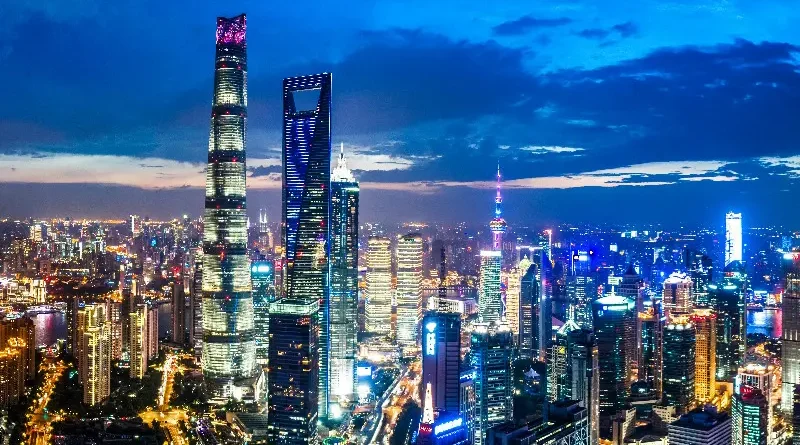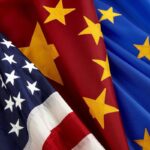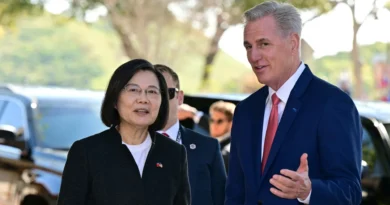China, a brief and concise compilation
PASCUAL SERRANO
We hear a lot about China's growing power and influence, both in economics and geopolitics. To assess it, many dense and in-depth studies may not be necessary and a quick but documented informative review may suffice. The following data comes from China News bulletin, Dongsheng Publishing Collective.
Let's start with the economy. According to statistical studies, China's GDP increased by 2023% in 5,2 with respect to the previous year. Total grain production in 2023 was 695,41 million tons, an increase of 8,88 million tons from the previous year. Total pork, beef, lamb and poultry production in 2023 was 96,41 million tons, up 4,5 percent from the previous year. The total added value of industrial enterprises increased by 4,6 percent from the previous year. For example, the production of solar cells, new energy vehicles and power generating units grew by 54.0 percent, 30.3 percent and 28.5 percent, respectively. The added value of services rose 5,8 percent compared to the previous year. For example, the added value of accommodation and catering, information transmission, software and information technology services, leasing and business services, transportation, warehousing and postal services, financial intermediation and retail grew 14.5 percent, 11.9 percent, 9.3 percent, 8.0 percent, 6.0 percent and 6.2 percent respectively. It also seems that domestic consumption is increasing. In 2023, total retail sales of consumer goods reached 47.149.5 trillion yuan, up 7,2 percent from the previous year.
In 2023, the consumer price index (CPI) rose 0.2 percent from the previous year. But that year the nominal increase available per capita national residents was 6.3 percent compared to the previous year, which represents 6.1 if we subtract the rise in the CPI.
Meanwhile, the US economy only grew 2,5% and inflation 3,4%, France 0,9% growth and 3,7% inflation; and Germany even decreased its growth by 0,3% and had inflation of 5,9%
Let's see how international business is going for China. The state-owned YLB of Bolivia signed a new deal with the Chinese consortium made up of the companies CATL, BRUMP and CMOC to develop a lithium carbonate plant, adding value at source. This is the second agreement that Bolivia signs with CATL: in January of last year, they agreed to the construction of two industrial complexes that are expected to produce 50.000 tons of lithium carbonate per year, with a total investment that could reach 9.900 billion Dollars.
In June, YLB signed two other agreements for a total of 1.400 billion dollars with the Chinese group Citic Guoan and the Russian Uranium One Group for two other lithium carbonate production plants, which should reach 45.000 tons per year.
Despite having the largest lithium reserves in the world (23,6% of the world total), Bolivia still has little capacity to industrialize it. Between January and November 2022, it produced only 635,5 tons of lithium carbonate. But thanks to this type of agreements, which it has signed with both Chinese and Russian companies, it could reach almost 100.000 tons in 2025.
BYD, the Chinese electric car company, will install its first factory outside Asia in the city of Camaçari in Brazil. It is estimated that more than 10.000 jobs will be created and more than 605 million dollars will be invested. Last year, BYD caught up with and in many countries even surpassed Tesla in sales. Elon Musk, CEO of Tesla, even said that trade barriers should be applied to the Chinese company. These days, a video of Musk from 2011, just 13 years ago, went viral, where he mocked of the possibility that BYD was a real competitor for Tesla.
Finally, the largest oil field in Iraq and one of the largest in the world, is now controlled mostly by PetroChina. ExxonMobil had controlled it since 2003, but handed it over to the Chinese company. Iraq is now China's third-largest supplier of oil, behind Russia and Saudi Arabia, and, like Russia, sells oil in yuan.
But not all of them are finances. Let's turn to China's diplomatic role over the past few months. The first month of the year was marked by multiple mediations by China between different countries or groups in the world. After bombings on the border that left 12 dead, Pakistan and Iran de-escalated tensions thanks to a successful intermediation from China and Saudi Arabia. This mediation is, without a doubt, a consequence of the restoration of relations between Saudi Arabia and Iran thanks to the negotiations led by China. On the other hand, the Myanmar military agreed to a Stop the fire immediately with an alliance of ethnic armed groups after some clashes near the border with China, and the Chinese government said it had negotiated the agreement.
Finally, after the Davos Forum, it was Zelensky himself, president of Ukraine, who asked China to mediate in the future peace process with Russia. The United States also asked China to mediate in the Red Sea conflict with the Ansar Allah group, also known as the Houthis of Yemen.
Since the new outbreak of the conflict between Israel and Palestine, China has advocated a two-state solution (in line with Arab countries), the creation of an independent Palestinian state and a concrete roadmap for an international peace conference. Now he has taken a new step by asking for full membership of Palestine at the UN. If there is a vote on this proposal, the United States would not have the power of veto as in other initiatives of that organization.
During January, Chinese Foreign Secretary Wang Yi visited seven countries from two continents in just 7 days: Brazil, Togo, Jamaica, Egypt, Tunisia and Ivory Coast. This intense trip marks a Chinese diplomatic agenda directed towards the countries of the Global South, with special attention to Africa. Also this month, the G77 celebrated the 3rd South Summit. China has been cooperating and participating with this bloc since the '90s, and at the summit the Chinese vice prime minister, Liu Guozhong said that the “collective rise” of the countries of the South is “unstoppable” and called for reforming the international financial system to overcome the “unequal and unjust order of the past, which continues to have persistent effects.”
And as for that thorn in China's side that is Taiwan, although the Democratic Progressive Party (PDP) that currently governs Taiwan, with a more pro-independence tendency and ties to the United States, won the presidential elections with more than 40% of the votes. votes, at the same time lost the legislative majority. The opposition that now controls Parliament (Kuomintang and the Taiwan People's Party) is committed to a friendlier relationship with mainland China.
Taiwan's international recognition continues to decline. Following Honduras' recognition of the One China principle last year, Nauru also severed diplomatic ties with Taiwan and established official relations with the People's Republic of China to adhere to the same principle. Now the so-called Republic of China is only recognized by 12 countries, although there could soon be 11: the elected president of Tuvalu promised to recognize the People's Republic of China, although the official announcement has not yet been formalized.
As we pointed out at the beginning, news from China appears skipped in the news, but perhaps it is through an adequate compilation that we can get an idea of what is happening in that country. Or rather, what is happening in the world due to what is happening in China.













